By: Moses Osiro MA,
‘We will not enjoy security without development, we will not enjoy development without security, and we will not enjoy either without respect for human rights.’
Former United Nations Secretary-General, The Late Kofi Annan
Development is intrinsic to human rights. Defined as the inalienable freedoms to be enjoyed by all members of the human race as according to the Universal Declaration of Human Rights (UDHR), human rights can either be understood in terms of the recognition or respect for human dignity, moral guidelines meant to promote and protect human values and identity or the ability to improve one’s living standard. Human nature dictates that people will in most cases seek progressive pathways for positive growth which generally translate to the improvement or betterment of their wellbeing. In this regard, conditions limiting or hindering the ability of people to improve their wellbeing can be described as a situation of Structural violence. Structural violence refers to when human beings are influenced so that their somatic and mental realizations are below their potential realization (Galtung, 1969). In other words, when people are unable to access their basic human needs and basic rights, they’re exposed to situations of structural conflict which if unresolved, can frequently lead to manifest violence.
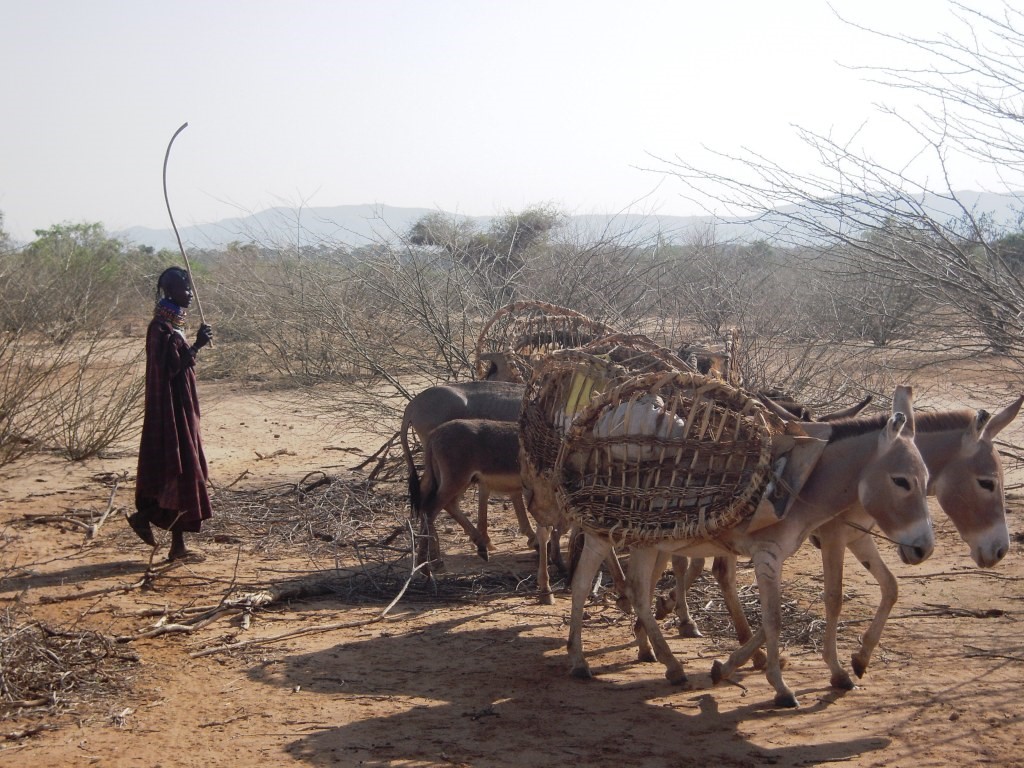
Among the warring communities in Eastern Africa, manifest and violent conflict is characterized by, inter-alia, loss of life and property; an indication that human rights, in all its fundamental facets, aren’t preserved and more importantly, human security is not guaranteed. In such situations, institutions are vital in providing systems through which both human security and human development are guaranteed. Dysfunctional institutions are therefore enablers of structural violence and manifest conflict. With this caveat in mind, the improvement of social conditions necessitates the formulation and implementation of robust intervention strategies that not only bolster institutional agency but also enhance the capacities of communities in pursuing sustainable peace and development in order for them to actualize their potentials. One of the leading organizations implementing its strategies based on the above-mentioned dictum is the Shalom Center for Conflict Resolution and Reconciliation (Shalom-SCCRR).
Shalom-SCCRR is a non-political and non-profit organization which is inter-religious and non-sectarian, and is committed to conflict transformation in peace-building within conflict environments of Eastern Africa. With a highly qualified team of men and women predominantly from Africa, the vision, mission and values of Shalom-SCCRR are centered on transforming the social contexts of manifest and structural violence, with their inherent violations of human rights, to firstly, situations of negative peace (stopping the killing, maiming and displacement) followed by positive peace (where all sides become mutually committed to the human security, development and interdependent wellbeing of each other).
Shalom-SCCRR’s intervention programs are both locally and globally renowned by like-minded organizations for their contributions toward observing and promoting human rights. For instance, Shalom-SCCRR received accreditation from the United Nations (U.N), which is the world’s institutional embodiment of peace, dignity and equality, for its great work in conflict resolution and peacebuilding in Africa.
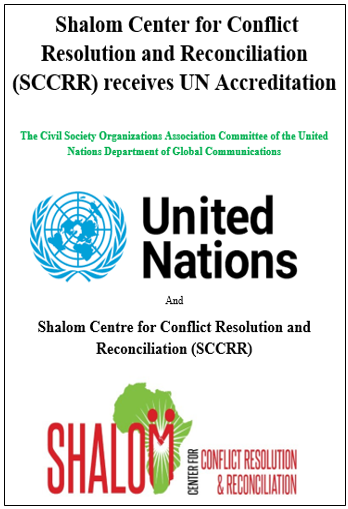
“Shalom distinguishes itself by its unique way of working, incorporating theory through research and practice through training on skills in conflict resolution and transformation. The organisation has a growing reputation for its peacebuilding work, professionalism, high research ability, and conflict sensitivity. Its well -structured training modules on analytical skills and knowledge of peacebuilding is a major contributor to our work…Shalom is unquestionably an exceptional organization to partner with. Shalom’s experience in the region suggests that the UN and Shalom would greatly benefit from this association”. IGAD’S endorsement of Shalom-SCCRR to the United Nations
Shalom-SCCRR’s collaborative and comprehensive intervention methodology is vested fully on cooperating with affected communities in order to set up locally-owned conflict management frameworks. Based on this collaborative methodology, Shalom-SCCRR can therefore derive data from the community through a very delicate, intense and thorough conflict analytical process, then apply the most suitable and strategic interventions to the nature of the conflict. By doing so, manifest and structural violence are transformed to conflict settlement >> negative peace >> to positive peace. Positive Peace is when all sides are mutually committed to the security, development and wellbeing of each other It is when all sides are absolutely committed to mutual independent co-existence ensuring human rights are actualized to the optimum (Devine, 2016).
“Shalom’s contextually driven, rigorous but adaptable and forward-looking methodology represents a model approach towards peacebuilding in highly complex situations, such as those that pertain in Northern Kenya. The approach, with its emphasis on community leadership, stakeholder participation, high technical competency, logic models, results frameworks, stories of change and advocacy linkages also reflects current best practice within both the peacebuilding and development sectors.”
Dr. Mike Williams, Misean Cara’s Consultant rating on Shalom-SCCRR’s Methodology
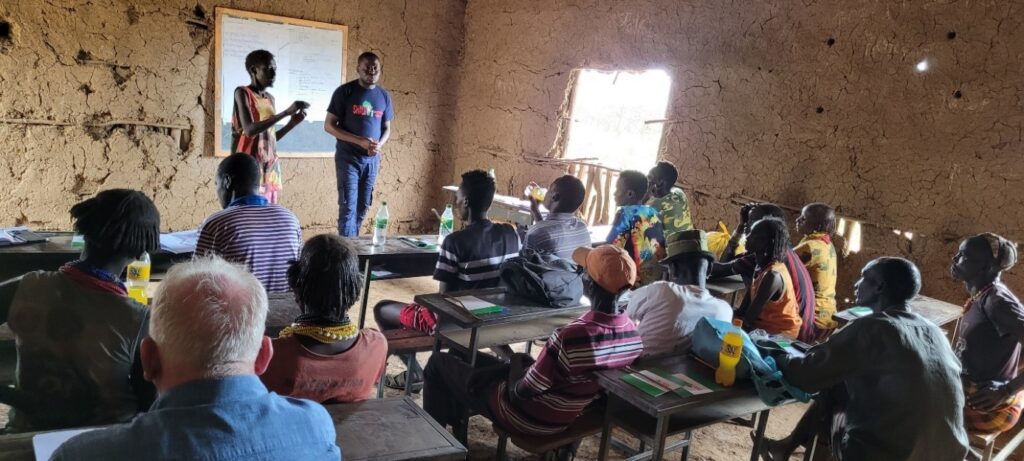
Despite the heterogeneity of dynamics that come with each conflict, the common denominator in all these conflicts is that all the structural violence meted out or experienced by communities are a threat to their human security, as a human right. Divided into four (4) aspects, human security encompasses political security which responds to patterns of democratic governance and observance of human rights; economic and social security which looks at rights from poverty and want; cultural security which focuses on rights from ethnic and religious dominance; and environmental security which sheds light on the right from environmental destruction and resource scarcity (Devine, 2016).
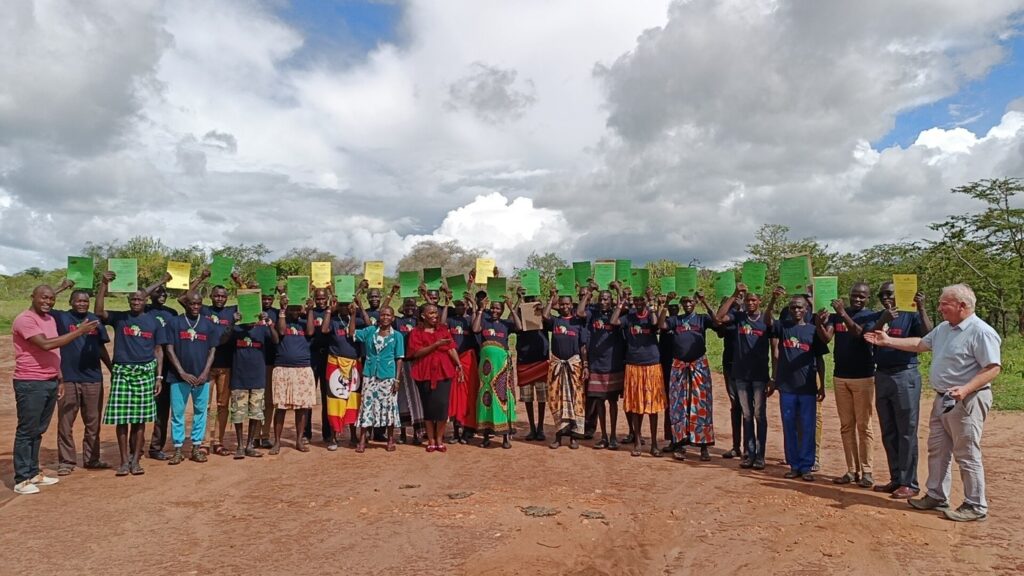
One of the most profound and prevalent forms of conflict experienced both in marginalized remote semi-arid terrains and urban informal settlements (slums) which Shalom-SCCRR focuses on, is intercommunal/inter-ethnic and inter-religious conflict. Owing to the multi-ethnic and multi-religious composition of communities living within Eastern Africa, ethnic and religious differences in certain areas, tend to emerge and translate into conflict behavior. This form of conflict has, to a great extent, inhibited affected communities from enjoying their cultural security thus leading to, inter-alia, loss of life and property. For example, the borderlines of Kenya, Somalia, Ethiopia, South Sudan and Uganda are home to different ethnic communities with diverse customs and traditions. Negative ethnic practices such as the killing of the ethnic other as a rite of passage, which undermines human rights, leads to an endless and vicious cycle of violence. Shalom-SCCRR, in its pursuit of peaceful and reconciled communities, continues to capacity-build communities through Conflict Transformation and Peacebuilding training workshops aimed at delivering knowledge about peace as a product for the communities to benefit from.
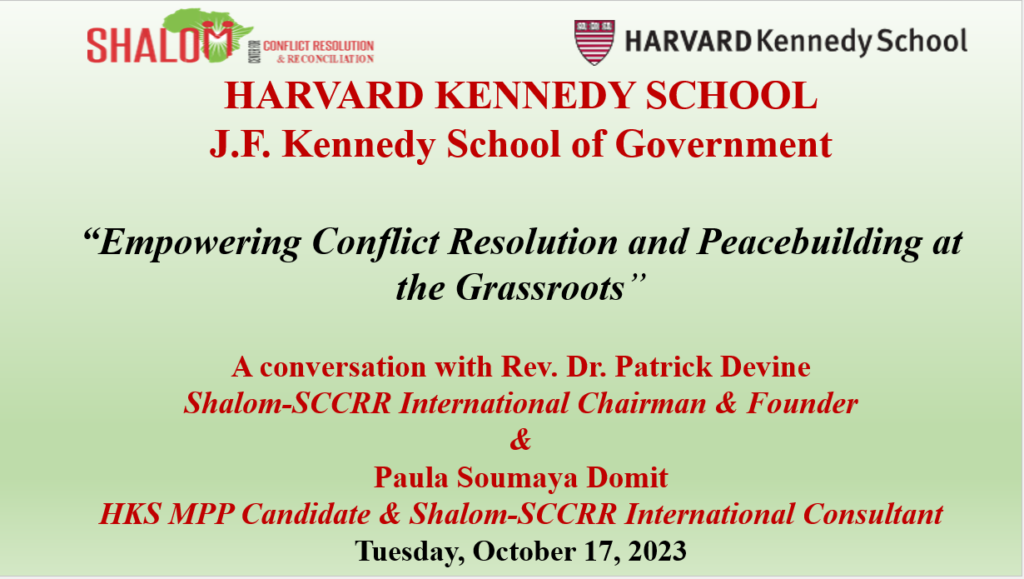
Of importance to note is that the environment under which these communities live is a strong enabler of conflict. Communities living in marginalized areas, often pastoralist, are confronted with immense resource scarcity where access to water, pasture for grazing are quite limited; a threat to their environmental security. The harsh climatic conditions sometimes force people into conflict in search of food and water for them to sustain themselves. Further exacerbating the situation is the loss of livestock and other livelihood means from natural disasters such as drought or floods which brings with it the issue of poverty.
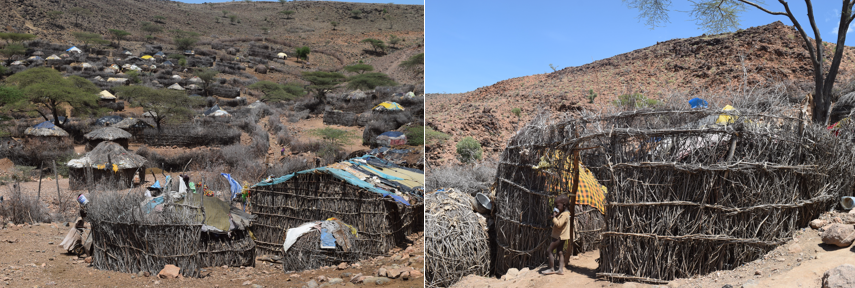
Through the application of its rigorous data driven methodology in Eastern Africa, Shalom-SCCRR has focused on the fact that marginalization, poverty and lack of education are critical structural contributors to conflict; a threat to economic and social security. Marginalized areas are mostly affected by this unfortunate state. Due to the inability of people to meet their basic human and ontological needs (identity, security and recognition) (Burton, 1991) and/or the unavailability of alternatives which would emanate from receiving formal education, community members experience structural violence and manifest conflict. Despite their best efforts, limited state intervention from state actors, has given rise to the expansion of institutional gaps which are supposed to assist communities in gaining access and guaranteeing such rights. It is to this extent that Shalom-SCCRR has intervened in a bid to bridge these institutional gaps.
Through the School/Educational Development intervention support, Shalom-SCCRR has provided infrastructural assistance as well as teaching and learning materials to schools in order to provide a conducive learning environment for pupils and students, as is their inherent to education. The net effect of this intervention is that the pupils/students will develop a culture of peace within themselves individually and collectively while also receiving formal education. This will expand their scope-alternatives vis-à-vis developing careers through which they can earn income and better their livelihoods.
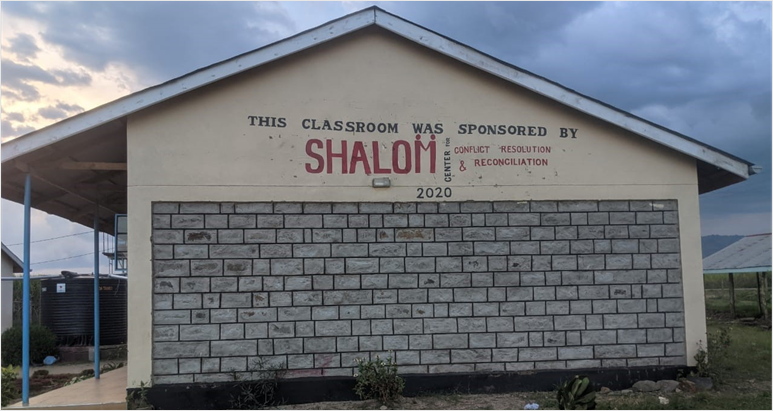
Within conflict environments, women and children as a unit, are but one of the marginalized groups vehemently experiencing the shocks of conflict. Women experience the intensity of the conflict profoundly. Conflicts often expose gender disparities where women, who bear the brunt of violent conflict, are excluded in decision-making and peacebuilding processes.
Bearing this in mind, Shalom-SCCRR has developed and refined its project which addresses violence against women and children through the Shalom Empowerment Center (SEC), located in Riruta with program outreach to Nairobi’s numerous urban informal settlement (slums). Shalom-SCCRR continues to empower more women with the necessary expertise required for them to be more proactive peacebuilding agents; thereby assisting them overcome the limitations often associated with negative attitudes and cultural vices against women.
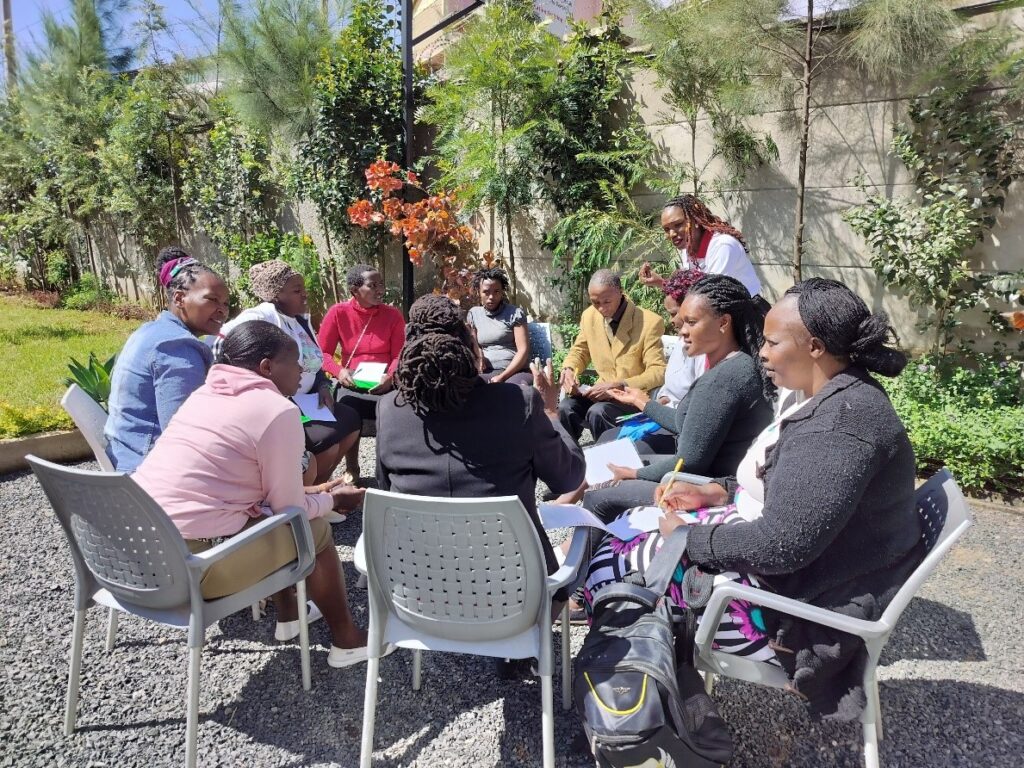
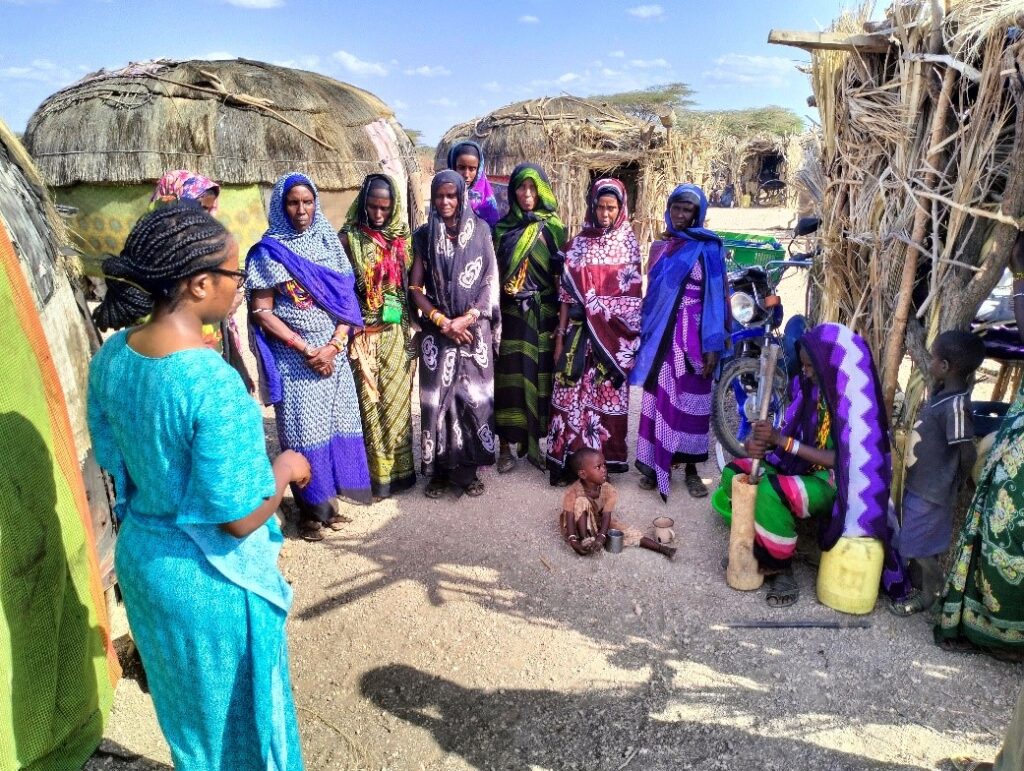
Shalom-SCCRR has taken things a notch higher by introducing a new focus area which is Human and Organ Trafficking prevention through SEC. Human trafficking is a gross violation and infringement of the right to life. Due to the complex but delicate nature of human trafficking networks not just within Africa but globally, there’s need for collaborative efforts between state and non-state actors in preventing and responding to human and organ trafficking.
Essentially, it is the primary responsibility of the state to provide human security to all people in equal measure. However, limited state intervention in some of these areas is proving challenging in conflict settlement and resolution. Be that as it may, state actors such as local government administration officials are generally supportive of non-state actors who are like-minded in their pursuit of sustainable peace and development within these warring communities. This is an axiomatic indicator that the state, through its various levels of government, recognizes the integral need to preserve political security, especially within the context of providing democratic governance and respecting human rights.
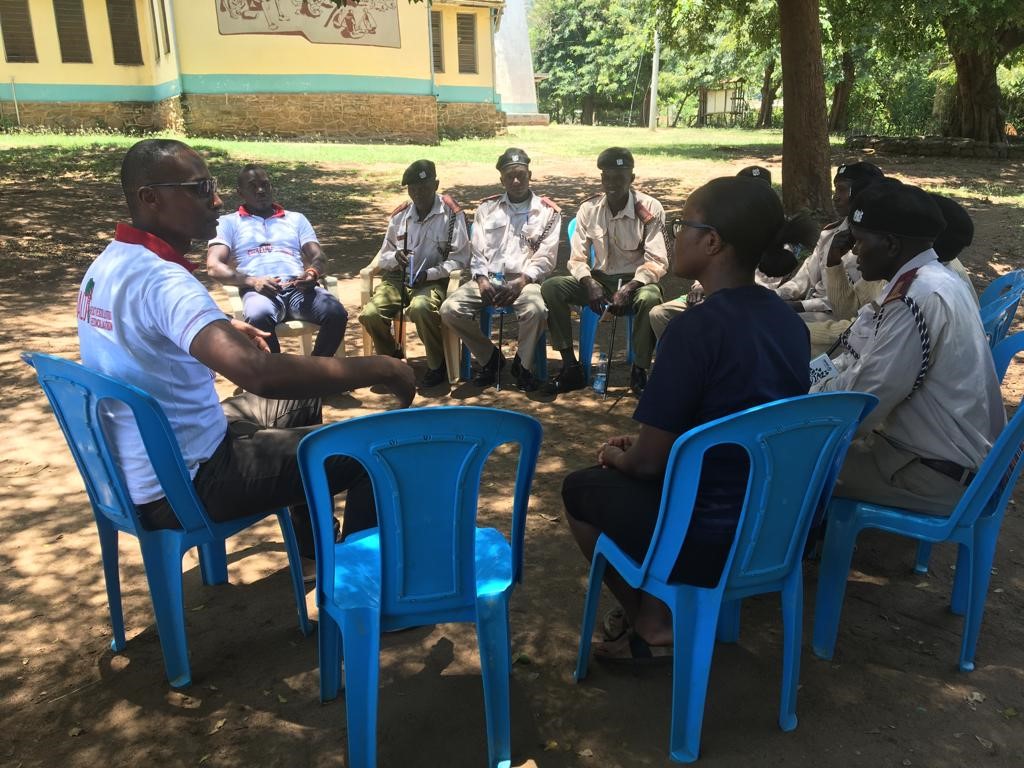
For instance, in Kenya, the electioneering period is usually marred by violent conflict. Shalom-SCCRR has identified conflict hotspots within Kenya such as along the Kisumu-Nandi borderline (Muhoroni-Tinderet respectively), Molo and Kuresoi in Nakuru County and in Nairobi’s urban informal settlements (slums) such as Kibra, Mathare and Kariobangi, while identifying electoral violence as a major cause of conflict. Shalom-SCCRR, in collaboration with local authorities and local communities, have worked hand in hand within these hotspots for the prevention of electoral violence.
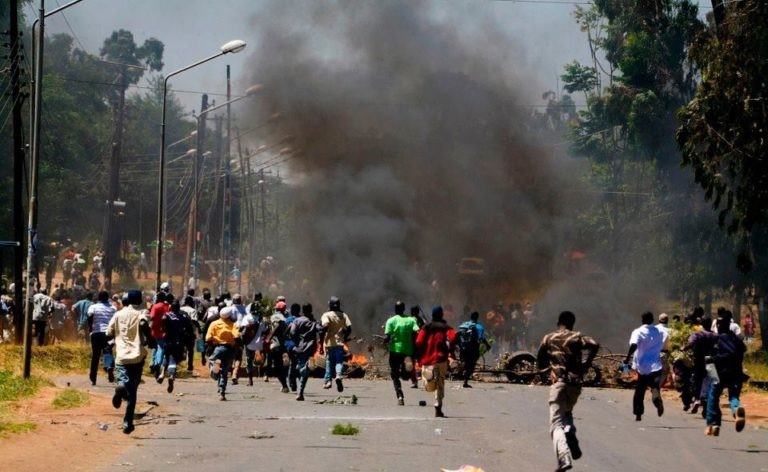
The nature and prevalence of conflicts not just within Eastern Africa but globally today is getting more volatile, uncertain and complex. The intricate dynamics of each conflict are further compounded and complicated by the various competing needs and interests from different parties. Despite these challenges, Shalom-SCCRR is dedicated to its vision and mission. Through its team members who possess not only the professional expertise but also the vocational commitment, Shalom-SCCRR will continue to journey with all affected communities in their pursuit of human rights within the framework of sustainable peace and community development.
We continue to appreciate and encourage our donors, friends, and supporters, whose immense contributions assist greatly in communities realizing this objective, to join us in this progressive and transformative work in making sure human rights are observed and human dignity is upheld for all those most in need.
Author:
Moses Osiro MA, Project Assistant
Relevant Links:
- Prof. Omoka. W. K and Devine, P. R. (2020). Human Rights are a Foundation of Shalom-SCCRR’s Conflict Resolution and Reconciliation Interventions. https://shalomconflictcenter.org/human-rights-are-a-foundation-of-shalom-sccrrs-conflict-resolution-and-reconciliation-interventions-2/
- Burton, J. (1991). Conflict Resolution as Political System, In Vamik Volkan et al. (Eds.), The Psychodynamics of International Relationships, Volume II: Unofficial Diplomacy at Work. Lexington, MA: Lexington Books.
- Devine, P., (2016). Persistent Conflict between the Pokot and the Turkana: Causes and Policy Implications [Unpublished Ph.D. Thesis]. University of Nairobi, Kenya. http://erepository.uonbi.ac.ke/handle/11295/97476
- Galtung, J (1969). Violence, Peace and Peace Research. Journal of Peace Research, 3, pp. 167-191.
- Moran, M. (2020). Eastern Africa: Shalom-SCCRR receives United Nations (UN) Accreditation. https://shalomconflictcenter.org/3901-2/
- Abonyo, A. (2022). Shalom-SCCRR success journey with the community towards building cohesion to counter inter-ethnic and political intolerance along the Kisumu-Nandi borderline. https://shalomconflictcenter.org/shalom-sccrr-success-journey-with-the-community-towards-building-cohesion-to-counter-inter-ethnic-and-political-intolerance-along-the-kisumu-nandi-borderline/
- Mwangi, F. (2022).Shalom-SCCRR Empowered Communities Sustaining Peace at the Kisumu-Nandi Borderline during the August 2022 Kenya’s General Elections. https://shalomconflictcenter.org/shalom-sccrr-empowered-communities-sustaining-peace-at-the-kisumu-nandi-borderline-during-the-august-2022-kenyas-general-elections/
- Osiro, M, & Macharia, A. (2023). Harnessing the Peace Dividends of Shalom-SCCRR’s Transformative Interventions in the Ilemi Triangle; borderline between Omorate in Ethiopia and Kokuro in Kenya. https://shalomconflictcenter.org/harnessing-the-peace-dividends-in-the-ilemi-triangle-along-the-kenya-and-ethiopia-borderline-shalom-sccrrs-transformative-intervention-strategies-in-omorate-in-ethiopia-and-kokuro-in-kenya/
- Devine, P. R. (2017). “Radicalization and Extremism in Eastern Africa; Dynamics and Drivers”, published in the Journal of Mediation and Applied Conflict Analysis, 4 (2): http://mural.maynoothuniversity.ie/9086/7/PD-Radicalisation-2017.pdf
- Prof. Omoka. W. K., Francis M. & Okoth G. (2016). Shalom’s Conflict Transformation and Peacebuilding Metrics: A Brief Overview. https://shalomconflictcenter.org/shaloms-conflict-transformation-and-peacebuilding-metrics-a-brief-overview/
- Shalom –SCCRR. (2017). EVIDENCE: Shalom’s Methodology leads to Conflict Prevention and Peacebuilding Progress. https://shalomconflictcenter.org/evidence-shaloms-methodology-leads-to-conflict-prevention-and-peacebuilding-progress/
- Shalom-SCCRR. (2016). Irish Minister Visits Shalom, Praises Work for Peace https://shalomconflictcenter.org/irish-minister-visits-shalom-praises-work-for-peace/
- Kibe, E. (2022). Shalom-SCCRR’s International Chairman, Rev. Dr. Patrick Devine addresses the Harvard Kennedy School, USA. https://shalomconflictcenter.org/shalom-sccrrs-international-chairman-rev-dr-patrick-devine-addresses-the-harvard-kennedy-school-usa/
- Domit, P. (2023). Wonderful Welcome and Experience with the Shalom Center for Conflict Resolution and Reconciliation (SCCRR). https://shalomconflictcenter.org/wonderful-welcome-and-experience-with-the-shalom-center-for-conflict-resolution-and-reconciliation-sccrr/
- Shalom-SCCRR. (2022). Shalom Empowerment Center (SEC) Addressing Violence against Women and Children: Concept Document. https://shalomconflictcenter.org/eastern-africa-shalom-empowerment-center-sec-addressing-violence-against-women-and-children-concept-document/
- Awed, A. (2021). The Girl-Child: Shalom-SCCRR Impacting Education & the Lives of Young Girls in Marginalized and Remote Locations in Eastern Africa. https://shalomconflictcenter.org/the-girl-child-shalom-sccrr-impacting-the-lives-of-young-girls-in-marginalized-and-remote-locations-in-eastern-africa/
- Shalom-SCCRR. (2022). 2009-2021 Shalom-SCCRR Results and Achievements. https://shalomconflictcenter.org/wp-content/uploads/2023/07/2009-2022-Shalom-SCCRR-Results-and-Achievements-2023-20230710-LV.pdf
- Shalom- SCCRR. (2023). 2023: January-June, School/Educational Development Projects By Shalom-SCCRR. https://shalomconflictcenter.org/2023-january-june-school-educational-development-projects-by-shalom-sccrr/
- Shalom-SCCRR. (2023). Prof. Wanakayi K. Omoka’s Understanding of the Philosophy and Work of Shalom-SCCRR Recollected; Augmented with 2022 Results by the Dept. of Monitoring, Evaluation, Research, and Learning (MERL). https://shalomconflictcenter.org/recalling-prof-wanakayi-k-omoka-phd-understanding-of-the-philosophy-and-work-of-shalom-sccrr-augmented-with-2022-shalom-sccrrs-achievements-and-results/
- Shalom-SCCRR. (2022). Shalom Empowerment Center (SEC) Addressing Violence against Women and Children: Concept Document. https://shalomconflictcenter.org/eastern-africa-shalom-empowerment-center-sec-addressing-violence-against-women-and-children-concept-document/
- Devine, P. R. (2023). Shalom-SCCRR Chairman’s Report on Progress and Achievements in 2022. https://shalomconflictcenter.org/chairmans-report-on-progress-and-achievements-in-2022/

